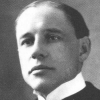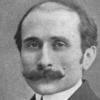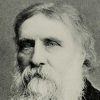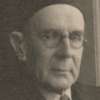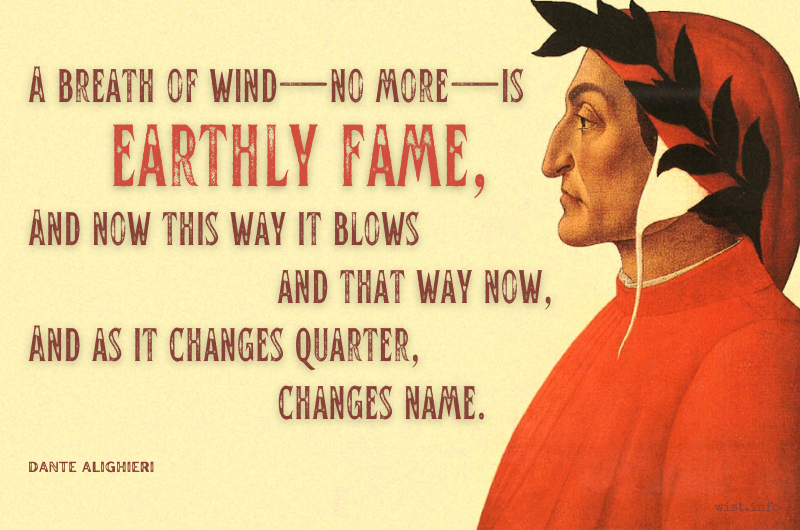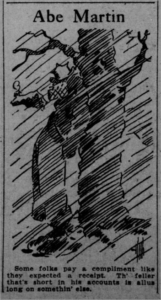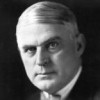Ambition is to the mind, what the cap is to the falcon; it blinds us first, and then compels us to tower, by reason of our blindness. But alas, when we are at the summit of a vain ambition, we are also at the depth of real misery. We are placed where time cannot improve, but must impair us; where chance and change cannot befriend, but may betray us; in short, by attaining all we wish, and gaining all we want, we have only reached a pinnacle, where we have nothing to hope, but every thing to fear.
Charles Caleb "C. C." Colton (1780-1832) English cleric, writer, aphorist
Lacon: Or, Many Things in Few Words, Vol. 1, § 37 (1820)
(Source)
The worst of superstitions is, to think
Your own to be the most endurable.
[…] Yours, the only one,
to which dim-sighted mankind may be trusted,
Till they can bear the brighter light of truth.[Der Aberglauben schlimmster ist, den seinen
Für den erträglichern zu halten […] dem allein
Die blöde Menschheit zu vertrauen, bis
Sie hellern Wahrheitstag gewöhne.]Gotthold Lessing (1729-1781) German playwright, philosopher, dramaturg, writer
Nathan the Wise [Nathan der Weise], Act 4, sc. 4 [Templar] (1779) [tr. Reich (1860)]
(Source)
Some of the translations leave out the second part.
(Source (German)). Alternate translations:
The worst of superstitions is to think
One's own most bearable.
[tr. Taylor (1790)]
That superstition is the worst of all
Which thinks itself the easiest to be borne --
[...] And to trust
To it alone a blind humanity
Till it is used to truth's more brilliant light.
[tr. Boylan (1878)]
The very worst
Of superstitions is, to hold one's own
The most endurable [...]
That only to entrust
Purblind humanity, till it learn to bear
The light of truth's clear day.
[tr. Corbett (1883)]
The worst of superstitions is, to think
One's own the most supportable. [...]
To it alone trust simple human-kind
Until to truth's bright rays it grows accustomed.
[tr. Jacks (1894)]
The worst of superstitions is to deem
Our special chains the most endurable --
[...] And to these alone
To trust purblind humanity until
Its eye can bear the brilliant noon of truth.
[tr. Maxwell (1917)]
The worst superstition is to consider one's own superstition the more tolerable one [...] to which alone to entrust weak-minded mankind until it will grow used to the brighter light of truth.
[tr. Reinhardt (1950)]
That superstition
Is worst which takes itself to be of all
The most endurable [...] and to which alone one may
Entrust dull-witted humankind, till it's
Accustomed to the brighter light of truth.
[tr. Morgan (1955)]
The most bigoted of superstitions is to hold one's own faith to be the only right one [...] which poor, blind men must trust until they see the light.
[tr. Ade (1972)]
There are some men who listen neither to reason nor to good advice, and who deliberately go astray through fear of being dominated.
[Il se trouve des hommes qui n’écoutent ni la raison ni les bons conseils, et qui s’égarent volontairement par la crainte qu’ils ont d’être gouvernés.]
Jean de La Bruyère (1645-1696) French essayist, moralist
The Characters [Les Caractères], ch. 4 “Of the Affections [Du Coeur],” § 71 (4.71) (1688) [tr. Stewart (1970)]
(Source)
(Source (French)). Alternate translations:
There are those men who will not hearken to reason, or good council, but deviate of their own Heads, purely for fear of being govern'd.
[Bullord ed. (1696)]
There are some Men who will not hearken to Reason and good Counsel, but deviate of their own Heads, purely for fear of being govern'd.
[Curll ed. (1713)]
There are some Men who turn the deaf Ear to Reason and friendly Counsel, and play the Fool of their own Heads, purely for fear of being governed.
[Browne ed. (1752)]
There are some men who turn a deaf ear to reason and good advice, and willfully go wrong for fear of being controlled.
[tr. Van Laun (1885)]
He who is content with what has been done is an obstacle in the path of progress.
Helen Keller (1880-1968) American author and lecturer
“Our Duties to the Blind,” speech, Massachusetts Assoc. for Promoting the Interests of the Adult Blind, Boston (1904-01-05)
(Source)
Reprinted in Out of the Dark: Essays, Lectures, and Addresses on Physical and Social Vision (1907).
AGE, n. That period of life in which we compound for the vices that we still cherish by reviling those that we have no longer the enterprise to commit.
Ambrose Bierce (1842-1914?) American writer and journalist
“Age,” The Cynic’s Word Book (1906)
(Source)
Included in The Devil's Dictionary (1911).
Originally published in the "Devil's Dictionary" column in the San Francisco Wasp (1881-02-12).
Nothing in education is so astonishing as the amount of ignorance it accumulates in the form of inert facts.
Henry Adams (1838-1918) American journalist, historian, academic, novelist
The Education of Henry Adams, ch. 25 (1907)
(Source)
A kiss, when all is said, what is it?
An oath sworn nearer by; a promise made
With greater certainty; a vow which seeks
To make itself more binding; a rosy dot
Placed on the ‘I’ in loving; ’tis a secret
Told to the mouth instead of to the ear;
A moment of the infinite, which makes
A sound like to the humming of bees’s wings;
A greeting like the sweet breath of a flower;
A way to feel the heart beat for a space,
And taste the soul a moment on the lips.[Un baiser, mais à tout prendre, qu’est-ce?
Un serment fait d’un peu plus près, une promesse
Plus précise, un aveu qui veut se confirmer,
Un point rose qu’on met sur l’i du verbe aimer;
C’est un secret qui prend la bouche pour oreille,
Un instant d’infini qui fait un bruit d’abeille,
Une communion ayant un goût de fleur,
Une façon d’un peu se respirer le cœur,
Et d’un peu se goûter, au bord des lèvres, l’âme!]Edmond Rostand (1868-1918) French playwright
Cyrano de Bergerac, Act 3, sc. 10 [Cyrano to Roxane] (1897) [tr. Kingsbury (1898)]
(Source)
Scene 9 in many translations. (Source (French)). Alternate translations:
After all, what is a kiss?
An oath that's given closer than before;
A promise more precise; the sealing of
Confessions that till then were barely breathed;
A ruby O to spell the verb: I love!
A secret that's confided to a mouth
And not to ears; a precious moment of
Infinity that buzzes like a bee;
Communion with the fragrance flowers have;
A gentle way for heart to breathe a heart,
For soul from fervid lips to drink a soul!
[tr. Reynauld (1898)]
A kiss! When all is said, what is a kiss? An oath of allegiance taken in closer proximity, a promise more precise, a seal on a confession, a rose-red dot upon the letter i in loving; a secret which elects the mouth for ear; an instant of eternity murmuring like a bee; balmy communion with a flavor of flowers; a fashion of inhaling each other’s heart, and of tasting, on the brink of the lips, each other’s soul!
[tr. Hall (1898)]
A kiss, when all is said, -- what is it?
An oath that's ratified, -- a sealèd promise,
A heart's avowal claiming confirmation, --
A rose-dot on the "i" of "adoration," --
A secret that to month, not ear, is whispered, --
Brush of a bee's wing, that makes time eternal, --
Communion perfumed like the spring's wildflowers, --
The heart's relieving in the heart's outbreathing,
When to the lips the soul's flood rises, brimming!
[tr. Thomas / Guillemard (1898)]
And what is a kiss, when all is done?
A promise given under seal -- a vow
Taken before the shrine of memory --
A signature acknowledged -- a rosy dot
Over the i of Loving -- a secret whispered
To listening lips apart -- a moment made
Immortal, with a rush of wings unseen --
A sacrament of blossoms, a new song
Sung by two hearts to an old simple tune --
The ring of one horizon around two souls
Together, all alone!
[tr. Hooker (1923)]
What is a kiss that you should fear it?
It is the instant when the body and spirit
meet, and in some divine alembic stirred
merge their two virtues in a lovelier third.
It is the interchange of sun and rose,
whose gold in heaven to earth its fragrance owes;
time, as it darkly passes over, lit
with the brief radiance of the infinite.
It is God's shadow silencing the heart.
[tr. Wolfe (1941)]
How
Shall we define a kiss? The sacrament of a vow,
The lightly stamped seal of a promise, the endorsement of
A promissory note on the bank of love,
The very O of love in the expectant lips,
Eternity in the instant the bee sips,
The music of the spheres on the lark’s wing,
A flower-tasting eucharist, a ring
Forged of two rings, red alchemized to gold.
[tr. Burgess (1971)]
After all, what is a kiss? A vow made at closer range, a more precise promise, a confession that contains its own proof, a seal placed on a pact that has already been signed; it’s a secret told to the mouth rather than to the ear, a fleeting moment filled with the hush of eternity, a communion that has the fragrance of a flower, a way of living by the beat of another heart, and tasting another soul on one’s lips!
[tr. Bair (1972)]
A kiss, what is it, after all?
The simple witness to a lover's will,
The seal that makes a promise ratified,
The longing-to-be-home half-gratified,
An unheard secret whispered to the mouth,
Coming upon the heart like the sweet south.
A claim, a gift, nature's communion-cup --
[tr. Fry (1975)]
And then, what is a kiss when all is said and done?
The seal fixed upon a promise given one to one,
a moment made immortal with a rush of unseen wings,
a new song to an old and simple tune, that one heart sings
to another, and a sacrament of blossoms, too.
[tr. Kornhauser (2003)]
Do you understand the significance of a kiss?
It’s the embowerment of a loved face,
a gift more closely given, a more precise
promise, a token of what is still to come,
the pit and pith, a silent honeycomb,
a secret for the lips, not for the ears,
an infinity of briefly buzzing stars
in the plant-textured, moist interior,
the private eucharist of a crimson flower,
a warm glade where love can tell its truth
and drink the hot soul from the open mouth.
[tr. Mahon (2004)]
A kiss! What is a kiss? A confession
Made from a little closer at hand, a promise
Delivered as soon as it's made,
A secret whispered close, with a mouth to hear it:
Eternity held in a moment that stings like a bee.
Passed like communion, a host with the scent of flowers,
a way to breathe the breath of the heart of another
And with one's lips to sip the beloved one's soul.
[tr. Clark (2005), l. 329ff]
A kiss, when all is said and done -- what is it?
Just the confirmation of an oath, sealing of a promise,
the confirmation of the promise of the heart,
a little pink dot on the "i" of "adoration,"
sharing a secret between mouths, not ears,
the brush of a bee's wing, that makes time eternal,
as mingling that smells like the wildflowers of spring,
relieving the heart by letting it breathe,
letting the lisp rise to drink from the soul!
[BookCaps ed.]
When all is said and done, what is a kiss? It's simply an oath made more certain, a sealed promise, the heart's confirmation of a pact. It's a secret whispered to the mouth instead of the ear, a stolen moment that makes time eternal, a communion perfumed like the spring's wild flowers. A kiss allows for one to live through the beating of another's heart, and to taste the very soul of another on one's lips!
[Source]
Why is it that we remember with effort but forget without effort? That we learn with effort but stay ignorant without effort? That we are active with effort, and lazy without effort?
[Quid est enim, quod cum labore meminimus, sine labore obliuiscimur; cum labore discimus, sine labore nescimus; cum labore strenui, sine labore inertes sumus?]Augustine of Hippo (354-430) Christian church father, philosopher, saint [b. Aurelius Augustinus]
City of God [De Civitate Dei], Book 22, ch. 22 (22.22) (AD 412-416) [tr. Green (Loeb) (1972)]
(Source)
(Source (Latin)). Alternate translations:
What is our labour to remember things, our labour to learn, and our ignorance without this labour? our agility got by toil, and our dullness if we neglect it?
[tr. Healey (1610)]
For why is it that we remember with difficulty, and without difficulty forget? learn with difficulty, and without difficulty remain ignorant? are diligent with difficulty, and without difficulty are indolent?
[tr. Dods (1871)]
How difficult it is to remember, how easy to forget; how hard to learn and how easy to be ignorant; how difficult to make an effort and how easy to be lazy.
[tr. Walsh/Honan (1954)]
How is it that what we learn with toil we forget with ease? that it is hard to learn, but easy to be in ignorance? That activity goes against the grain, while indolence is second nature?
[tr. Bettenson (1972)]
Why is it that we remember with such difficulty, but forget so easily? Why is it that we learn with such difficulty, yet so easily remain ignorant? Why is it that we are vigorous with such difficulty, yet so easily inert?
[tr. Dyson (1998)]
LEAR: When we are born, we cry that we are come
To this great stage of fools.William Shakespeare (1564-1616) English dramatist and poet
King Lear, Act 4, sc. 6, l. 200ff (4.6.200-201) (1606)
(Source)
If you can’t control your reproduction, you can’t control your life.
Joycelyn Elders (b. 1933) American pediatrician, public health administrator, academic
Interview by Claudia Dreifus, New York Times (1994-01-30)
(Source)
A frequent phrase of hers.
Yes, poor doggie, you are very stupid, very stupid indeed, compared with us clever men, who understand all about politics and philosophy, and who know everything in short, except what we are, and where we came from, and whither we are going, and what everything outside this tiny world and most things in it are.
Jerome K. Jerome (1859-1927) English writer, humorist [Jerome Klapka Jerome]
“On Cats and Dogs,” The Idle Thoughts of an Idle Fellow (1889)
(Source)
Were you to reach the ripe old age of death,
instead of dying prattling in your crib,
would you have more fame in a thousand years?
What are ten centuries to eternity?
Less than the blinking of an eye compared
to the turning of the slowest of the spheres.[Che voce avrai tu più, se vecchia scindi
da te la carne, che se fossi morto
anzi che tu lasciassi il ‘pappo’ e ’l ‘dindi’,
pria che passin mill’anni? ch’è più corto
spazio a l’etterno, ch’un muover di ciglia
al cerchio che più tardi in cielo è torto.]Dante Alighieri (1265-1321) Italian poet
The Divine Comedy [Divina Commedia], Book 2 “Purgatorio,” Canto 11, l. 103ff (11.103-108) [Oderisi of Gubbio] (1314) [tr. Musa (1981)]
(Source)
Dante refers to two childish terms, which various translators note as
- "pappo" perhaps "father" (padre), or "bread" (pane) or just "baby food" (cf. English "pap")
- "dindi," probably "money" (danari/denaro)
(Source (Italian)). Alternate translations:
Ah! where's your 'vantage, if yon cast away,
In years, the muddy vesture of decay,
As when the swathe involves your tender frame?
Can you suppose her long, sonorious blast,
Thro' twice six thousand changing Moons, will last?
Yet, what is that to Heav'n's eternal year? --
Less, than the quick glance of human eye,
To that slow movement of the ample Sky,
That turns around the universal Sphere!
[tr. Boyd (1802), st. 20-21]
Shalt thou more
Live in the mouths of mankind, if thy flesh
Part shrivel’d from thee, than if thou hadst died,
Before the coral and the pap were left,
Or ere some thousand years have passed? and that
Is, to eternity compar’d, a space,
Briefer than is the twinkling of an eye
To the heaven’s slowest orb.
[tr. Cary (1814)]
More fame shalt thou enjoy, if once old age
Wear flesh away, than if thou hadst expired
Ere left the breast, or coral last admired?
A thousand years' eternity to thee
Far shorter than the eyebrow's movement fleet
To slowest orbit stars of heaven complete.
[tr. Bannerman (1850)]
What fame shalt thou have more, if old peel off
From thee thy flesh, than if thou hadst been dead
Before thou left the 'pappo' and the 'dindi,'
Ere pass a thousand years? which is a shorter
Space to the eterne, than twinkling of an eye
Unto the circle that in heaven wheels slowest.
[tr. Longfellow (1867)]
What fame wilt thou have more, if when it is old thou loose from thee thy flesh, than if thou hadst died before thou hadst left off thy child's prattle, ere a thousand years are past? which beside the eternal is a shorter space than is a movement of the eyelid beside the circle which in heaven turns the slowest.
[tr. Butler (1885)]
If thou stripp'st off thy aged flesh, wilt share
More fame than if thou'dst early died in grace
Before thou'dst ceased thy childish prattle,
A thousand years have past? A briefer space
Beside the eternal, than a glance of the eye
By that star's orbit, longest whirled through space.
[tr. Minchin (1885)]
What more fame shalt thou have, if thou strippest old flesh from thee, than if thou hadst died ere thou hadst left the pap and the chink, before a thousand years have passed? -- which is a shorter space compared to the eternal than a movement of the eyelids to the circle that is slowest turned in Heaven.
[tr. Norton (1892)]
What greater fame shalt thou have, if thou strip thee of thy flesh when old, than if thou hadst died ere thou wert done with pap and chink,
before a thousand years are passed? which is shorter space to eternity than the twinkling of an eye to the circle which slowest is turned in heaven.
[tr. Okey (1901)]
What more fame shalt thou have if thou put off thy flesh when it is old than if thou hadst died before giving up pappo and dindi, when a thousand years are past, which is a shorter space to eternity than the twinkling of an eye to the slowest turning circle in the heavens?
[tr. Sinclair (1939)]
Wilt thou have more fame if old age unwrap
Thy bones from withered flesh than if thy race
Ended ere thou wert done with bib and pap
Before a thousand years pass, -- shorter space
To eternity than is a blinked eye-lid
To the circle in heaven that moves at slowest pace?
[tr. Binyon (1943)]
Ten centuries hence, what greater fame hast thou,
Stripping the flesh off late, than if thou'dst died
Ere thou was done with gee-ger and bow-wow?
Ten centuries hence -- and that's a brief tide,
Matched with eternity, than one eye-wink
to that wheeled course Heaven's tardiest sphere must ride.
[tr. Sayers (1955)]
Though loosed from flesh in old age, will you have
in, say, a thousand years, more reputation
than if you went from child's play to the grave?
What, to eternity, is a thousand years?
Not so much as the blinking of an eye
to the turning of the slowest of the spheres.
[tr. Ciardi (1961)]
What greater fame will you have if you strip off your flesh when it is old than if you had died before giving up pappo and dindi, when a thousand years have passed, which is a short4er space compared to the eternal than the movement of the eyelids to that circle which is slowest turned in heaven?
[tr. Singleton (1973)]
What greater name will you have, if you are old
When you put aside your flesh, than if you had died
Before you had given up baby-talk and rattles,
Once a thousand years have passed? And that is a shorter
Space to the eternal than the flash of an eyelid
To the circle which turns in the heavens most slowly.
[tr. Sisson (1981)]
Before a thousand years have passed -- a span
that, for eternity, is less space than
an eyeblink for the slowest sphere in heaven --
would you find greater glory if you left
your flesh when it was old than if your death
had come before your infant words were spent?
[tr. Mandelbaum (1982)]
What more acclaim will you have if you strip off your flesh when it is old, than if you had died before you left off saying ‘pappo’ and ‘dindi,’
before a thousand years have passed? which is a briefer space compared with eternity than the blinking of an eye to the circle that turns slowest in the sky
[tr. Durling (2003)]
What more fame will you have, before a thousand years are gone, if you disburden yourself of your flesh when old, than if you had died before you were done with childish prattle? It is a shorter moment, in eternity, than the twinkling of an eye is to the orbit that circles slowest in Heaven.
[tr. Kline (2002)]
What more renown will you have if you strip
your flesh in age away than if you died
before you’d left off lisping "Din-dins!", "Penth!"
when once a thousand years have passed, a space
that falls far short of all eternity --
an eye blink to the slowest turning sphere.
[tr. Kirkpatrick (2007)]
Will greater fame be yours if you put off
your flesh when it is old than had you died
with pappo and dindi still upon your lips
after a thousand years have passed? To eternity,
that time is shorter than the blinking of an eye
is to one circling of the slowest-moving sphere.
[tr. Hollander/Hollander (2007)]
Suppose you get to be old, before you discard
Your flesh, how much more fame will go with your name,
After a thousand years, if "Pappy" and "Mammy"
were still on your tongue when you died? And a thousand years
Compared with life eternal, is like an eyelid
Flutter compared with the slowest stars int he skies.
[tr. Raffel (2010)]
To be trusted is a greater compliment than to be loved.
At your approach the neighbours flee,
What is the cause that makes them flout you.
And that wherever you may be
A desert seems to spread about you?A tigress of her whelps bereft
May fill the bravest heart with terror;
Untouched the basking snake is left
And handling scorpions is an error;But you provide a peril worse —
Tis this, you overact the poet;
When you persist in reading verse,
Could any patience undergo it?For though I run or stand or sit
With verse my ears are still blockaded;
Aye, at the baths I must submit,
My privy chambers are invaded,You stop me on my way to dine,
Then wearied by your droning numbers
My seat at table I resign —
I fall asleep — you break my slumbers.Observe the evil that you do.
Though good, men hold you as pernicious ;
And thus an upright bore like you
Makes even virtue look suspicious.[Occurrit tibi nemo quod libenter,
Quod, quacumque venis, fuga est et ingens
Circa te, Ligurine, solitudo,
Quid sit, scire cupis? Nimis poeta es.
Hoc valde vitium periculosum est.
Non tigris catulis citata raptis,
Non dipsas medio perusta sole,
Nec sic scorpios inprobus timetur.
Nam tantos, rogo, quis ferat labores?
Et stanti legis et legis sedenti,
Currenti legis et legis cacanti.
In thermas fugio: sonas ad aurem.
Piscinam peto: non licet natare.
Ad cenam propero: tenes euntem.
Ad cenam venio: fugas sedentem.
Lassus dormio: suscitas iacentem.
Vis, quantum facias mali, videre?
Vir iustus, probus, innocens timeris.]Martial (AD c.39-c.103) Spanish Roman poet, satirist, epigrammatist [Marcus Valerius Martialis]
Epigrams [Epigrammata], Book 3, epigram 33 (3.44) (AD 87-88) [tr. Pott & Wright (1921)]
(Source)
"To Ligurinus." (Source (Latin)). Alternate translations:
That none would meet thee willingly,
But where so ere thou com'st, all fly
O Ligurinus, wouldst thou know it?
The cause is th' art too much a Poet.
That fault is wondrous dangerous.
No Tiger robb'd of whelpes by us
So much is fear'd, no Scorpion,
Nor Dipsas basking in the Sun.
For who can ere endure such paine?
Standing thou read'st, sitting againe;
Running, and at the privy too.
To th' bath I goe; there readest thou.
I goe to swimme; thy Booke delayes me.
I goe to supper; thence it stayes me.
When I am set, thy reading makes me
To rise; and when I sleepe, it wakes me.
Behold, what hurt thou dost. None can
Brooke thee a just, good, harmelesse man.
[tr. May (1629)]
You come: away flies every mother's son:
On Bagshot Heath you can't be more alone.
If you ask, why? -- You are bewitch'd with rhime:
And this, believe me, is a dangerous crime.
Robb'd of her whelps a tigress thus we shun;
Or viper basking in the noon-day sun:
Not more the dreadful scorpion's sting we fear,
Than this incessant lugging by the ear.
Standing or sitting, you repeat your lays:
On my close-stool I hear them; in my chaise:
Your trumpet on the water strikes my ear.
I at Vaux-haull no other music hear.
When dinner waits, you seise me by the button:
At table plac'd, you drive me from my mutton:
From a sweet nap you rouse me by your song.
How much by this yourself and me you wrong!
The man of worth the poet makes us fly;
And by your verse we lose your probity.
[tr. Hay (1755)]
That happiness and thee can no man meet,
Where'er thou rom'st, that one and all retreat;
That thee a solitude immense surrounds,
The why thy knowledge and thy wit confounds.
The why is this: thou art a very poet.
The fault is not, to be one; but to show it.
Not so, of whelps bereft a tigress dire;
Not so, a sunburnt serpent in her ire;
Us not the balefull scorpion so can scare:
What living man con constant murder bear?
Standers thou readest down, and those that sit;
And him that runs, and him that works his wit.
Flying into the bath, I waters limn:
Plunging into the pond, I may not swim.
I haste to supper; thou detain'st in spite:
I lean at supper: thou enjoy'st my flight.
When sleep would mercifully seal mine eyes,
Thou mercilessly bidd'st the slumb'rer rise.
Would'st comprehend what words thou work'st of woe?
The cause and consequence one word shall show.
A man for parts and probity rever'd,
Thou art by all, insted of worshipt, FEAR'D.
[tr. Elphinston (1782), Book 7, ep. 25]
Do you wish to know the cause why no one willingly meets you? that wherever you come, Ligurinus! you put people to flight, and create a solitude around you? The cause is, that you are too much of a poet. This is a very perilous fault. A tiger exasperated by the capture of her whelps, a serpent scorched by the mid-day sun, a fierce scorpion are objects of less dread. For, I ask, who would willingly sustain the labours you are in the habit of imposing? You read your verses to the stander, you read them to the sitter, you read them to the runner, you read them to every one, whatever he is about. I fly to the warm baths, your voice sounds in my ear. I seek a cold bath, you interrupt my swimming. I hasten to supper, you detain me on the way; I have got to supper before you, you oblige me to change my seat. I am wearied with hearing you, and go to sleep, you rouse me as I recline on my couch. Do you desire to know the harm you do? Just, moral, innocent as you are known to be by all men, by all men you are feared.
[tr. Amos (1858), "An Inopportune Reciter"]
Do you wish to know the reason, Ligurinus, that no one willingly meets you; that, wherever you come, everybody takes flight, and a vast solitude is left around you? You are too much of a poet. This is an extremely dangerous fault. The tigress aroused by the loss of her whelps, the viper scorched by the midday sun, or the ruthless scorpion, are less objects of terror than you. For who, I ask, could undergo such calls upon his patience as you make? You read your verses to me, whether I am standing, or sitting, or running, or about private business. I fly to the hot baths, there you din my ears: I seek the cold bath, there I cannot swim for your noise: I hasten to dinner, you stop me on my way; I sit down to dinner, you drive me from my seat: wearied, I fall asleep, you rouse me from my couch. Do you wish to see how much evil you occasion? -- You, a man just, upright, and innocent, are an object of fear.
[tr. Bohn's Classical (1859)]
Why everybody shuns your sight,
And why, since all are put to flight,
Wherever your approach is viewed,
The place is one vast solitude : --
This, Ligurinus, would you know?
You're too poetical, I trow.
'Tis dangerous having this repute.
Not savage tigress in pursuit
Of them that stole her whelps away,
Not serpent, scorched by burning ray
Of Libya's sun, not scorpion fell
Is deemed by all so terrible.
For, prythee tell me, who could bear
The burdens you for folk prepare?
Should I stand by, your rhymes you read;
Or if I sit, you still proceed.
To the hot baths I fly for fear:
You din your verses in my ear.
Chased thence, I seek the plunge-bath's brim:
But while you're ranting, who could swim?
To dinner then I haste: alack!
Just as I start, you hold me back.
The table reached, I fain would eat:
You scare me as I take my seat.
Quite wearied out, to sleep I try:
You rouse me ere I down can lie.
Shall I, my friend, make plain to you
What serious mischief 'tis you do?
All fear you still, and fly you far,
Good, upright, blameless as you are.
[tr. Webb (1879)]
The cause of the rout
When it's rumored you're out,
Since you wish, Ligurinus, to know it.
Of your making bare space
Of a populous place
Is just this -- you're too much of a poet.
It 's a terrible thing.
This craving to sing:
No tiger that 's robbed of her youngling.
No snake in the sun,
No irate scorpion
Is so feared as your metrical bungling.
Whether one's sitting down.
Or is walking down town.
Or is even engaged with his toilet,
Or stretching a limb
In a run at the gym,
Up you come with an eclogue to spoil it.
When I flee to the bath
You are fast on my path,
Bawling ballads that drive me phrenetic.
I jump in the tank
And reflect if I sank
That drowning's at least anaesthetic.
When I run out to meals
You recite at my heels,
Read me epitaphs while I'm at table.
I retire, wearied out.
And am waked by your shout
That I must hear your versified fable.
Now a poet's worst rhymes
May be doubtful at times.
But the best ones of yours are outrageous
You see now, I trust,
Why, though honest and just.
You are treated like something contagious.
[tr. Nixon (1911), "The Progress of Poesy"]
That no man willingly meets you, that, wherever you arrive, there is flight and vast solitude around you, Ligurinus, do you want to know what is the matter? You are too much of a poet. This is a fault passing dangerous. No tigress roused by the robbery of her cubs, no viper scorched by tropic suns, nor deadly scorpion is so dreaded. For who, I ask you, would endure such trials? You read to me while I am standing, and read to me when I am sitting; while I am running you read to me, and read to me while I am using a jakes. I fly to the warm baths: you buzz in my ear; I make for the swimming bath: I am not allowed to swim; I haste to dinner: you detain me as I go; I reach the table: you rout me while I am eating. Wearied out, I sleep: you rouse me up as I lie. Do you want to appreciate the evil you cause? Though you are a man just, upright, and harmless, you are a terror.
[tr. Ker (1919)]
That no one, Ligurinus, likes to meet
Your visage, that there's panic in the street
At your approach, the reason, would you know it?
Well, Ligurinus, you're too much a poet.
A grievous fault, with perilous mischief fraught.
No tigress, for her captive brood distraught,
Puff-adder sweltering in the noon-tide heat,
Or ruthless scorpion is so dread to meet.
Who can endure it? Standing, in repose,
Your strain pursues me; while I bathe it flows.
I seek the swimming-pool; no refuge there.
I haste to dinner; there's another scare.
Weary I sleep; you wake me. What's your error?
Just, righteous, harmless, you're a holy terror.
[tr. Francis & Tatum (1924), ep. 138]
No one wants to meet you: When you arrive
there’s a wild rush for the exits,
and a great vacuum develops around you.
You want to know why?
It’s because you’re too much the poet.
Your art poses a decidedly dangerous threat,
it makes you more to be feared than a leaping tigress
whose cubs have been taken from her;
worse than midday heat that makes thirsty people frantic,
worse than the vengeful scorpion, are you to be feared.
Who can stand up under the punishing work
you heap on our shoulders? You read your stuff
when I'm standing still, you read your stuff
when I'm on the run, you read your stuff
when I'm on the pot. I head for the baths
where your voice bounces off the walls
and dins in my ears. I try the swimming pool --
but you won't let me swim. As I'm hurrying off
to a dinner party, you detain me to listen,
and when I get there, there you are too,
pursuing me when I'm supine on the couch,
tired, I like down to sleep, but you
have to wake me up to listen.
Can't you bring yourself to see how much wrong
you're doing me? Here you are, a fine honest fellow,
an innocent bystander --
and we're all scared to death of you.
[tr. Bovie (1970)]
Why, you ask, whenever you show your face
Is there a public stampede, a vast unpopulated space?
The answer -- you may as well know it --
Is that you overact the poet:
A grave fault,
Ligurinus, and one which could easily earn you assault.
The tigress robbed of her young,
The scorpion's tail, the heat-crazed puff-adder's tongue
Are proverbial, but you're worse;
For who can endure ordeal by verse?
You read to me when I'm standing and when I'm sitting,
When I'm running and when I'm shitting,
If I head for the warm baths you make my ears buzz with your din,
If I want a cold dip you stop me from getting in,
If I'm hurrying to dinner you detain me in the street,
If I reach the table you rout me out of my seat,
If I collapse, exhausted, into bed you drag me to my feet.
Do you never pause
To consider the havoc you cause?
You're a decent citizen, upright and pious,
But, by God, you terrify us!
[tr. Michie (1972)]
Do you wish to know why it is, Ligurinus, that nobody is glad to meet you, that, wherever you go, there is flight and a vast solitude around you? You are too much of a poet. This is a very dangerous fualt. A tigress roused by the theft of her cubs is not feared os much, nor yet a viper burnt by the midday sun, nor yet a vicious scorpion. For I ask you, who would endure such trials? You read to me as I stand, you read to me as I sit, you read to me as I run, you read to me as I shit. I flee to the baths: you boom in my ear. I head for the pool: I'm not allowed to swim. I hurry to dinner: you stop me in my tracks. I arrive at dinner: you drive me away as I eat. Tired out, I take a nap: you rouse me as I like. Do you care to see how much damage you do? A just man, upright and innocent, you are feared.
[tr. Shackleton Bailey (1993)]
You wonder why no people pay you heed?
Well, I'll unveil the mystery -- you read.
Incessantly, you foist on us your rhymes,
A legendary peril of our times.
No mother tiger snarling near her cubs,
No snake attacking us despite our clubs,
No scorpion paralyzingly come near,
Can deal us such humiliating fear
As you, in undeterr'd reciting mode
Producing endless drivel by the load.
I stop and you are dinning in my ear,
I run and hear you panting in the rear.
you fill our homes with unremitting roar.
I even hear you through the outhouse door.
A public nuisance at the public bathing,
For tow'ls you give us pages for our swathing.
To dinner we go in, out comes your verse.
The same old tired nonsenses or worse.
At street corners we timorously look
To seek if you are lurking in a nook,
Poised to bombard us with your lethal book.
I go to bed and still I hear you drone.
Have you no soundproof hovel of your own?
Some honesty you have, but far below it,
You are that deepest pestilence -- a poet.
[tr. Wills (2007)]
There is no Negro problem. There is no Southern problem. There is no Northern problem. There is only an American problem. And we are met here tonight as Americans — not as Democrats or Republicans — we are met here as Americans to solve that problem.
This was the first nation in the history of the world to be founded with a purpose. The great phrases of that purpose still sound in every American heart, North and South: “All men are created equal” — “government by consent of the governed” — “give me liberty or give me death.” Well, those are not just clever words, or those are not just empty theories. In their name Americans have fought and died for two centuries, and tonight around the world they stand there as guardians of our liberty, risking their lives.
Those words are a promise to every citizen that he shall share in the dignity of man. This dignity cannot be found in a man’s possessions; it cannot be found in his power, or in his position. It really rests on his right to be treated as a man equal in opportunity to all others. It says that he shall share in freedom, he shall choose his leaders, educate his children, and provide for his family according to his ability and his merits as a human being.
To apply any other test — to deny a man his hopes because of his color or race, his religion or the place of his birth — is not only to do injustice, it is to deny America and to dishonor the dead who gave their lives for American freedom.Lyndon B. Johnson (1908-1973) American politician, educator, US President (1963-69)
“The American Promise,” speech to a Joint Session of Congress [07:41] (1965-03-15)
(Source)
For all you can hold in your cold dead hand
Is what you have given away.Joaquin Miller (1837-1913) American poet [pen name of Cincinnatus Heine (or Hiner) Miller]
“Peter Cooper (Died 1883),” ll. 11-12, In Classic Shades and Other Poems (1890)
(Source)
This phrasing of the sentiment seems to have been made by Miller, but the sentiment itself predates him in various ways. See, for example, Martial, Epigram 5.42 (AD 90): "You keep thus always what you gave."
Edward Gibbon, in his Decline and Fall of the Roman Empire,, ch. 61 (1776), notes the epitaph of 15th Century Earl Edward Courtenay of Devonshire:
What we gave, we have;
What we spent, we had;
What we left, we lost.
Miller was himself quoted by Edwin M. Poteat, President of Furman University, in his poem "What You Have Given Away" (1909). Poteat put the phrase in quotation marks, but is sometimes still given full credit.
Elbert Hubbard may have been borrowing from Miller in his Little Journeys to the Homes of the Great, Vol. 12 "Great Scientists," "Haeckel" (collected in 1916, but published earlier), where he writes:
We keep things by giving them to others. The dead carry in their clenched hands only that which they have given away; and the living carry only the love in their hearts which they have bestowed on others.
Finally, often in the variant form "All we can hold in our cold dead hands is what we have given away," the phrase is today often identified as a Sanskrit proverb. The universality of thought means it may well have an ancient Indian inspiration, but the language may indicate a tie to Miller's poem, as promulgated. The "Sanscrit proverb" appears as such in Hoyt's New Cyclopedia of Practical Quotations (1922), but not in the 1896 edition. This may be taken from a letter to the editor, New York Times (1908-07-25) by Emily Noble, identifying this as the translation of a Sanskrit proverb.
A person who lacks the means, within himself, to live a good and happy life will find any period of his existence wearisome. But rely for life’s blessings on your own resources, and you will not take a gloomy view of any of the inevitable consequences of nature’s laws. Everyone hopes to attain an advanced age; yet when it comes they all complain! So foolishly inconsistent and perverse can people be.
[Quibus enim nihil est in ipsis opis ad bene beateque vivendum, eis omnis aetas gravis est; qui autem omnia bona a se ipsi petunt, eis nihil malum potest videri quod naturae necessitas adferat. Quo in genere est in primis senectus, quam ut adipiscantur omnes optant, eandem accusant adeptam; tanta est stultitiae inconstantia atque perversitas.]
Marcus Tullius Cicero (106-43 BC) Roman orator, statesman, philosopher
De Senectute [Cato Maior; On Old Age], ch. 2 / sec. 4 (2.4) [Cato] (44 BC) [tr. Grant (1960, 1971 ed.)]
(Source)
(Source (Latin)). Alternate translations:
For eche of thies ages which men name Childhode, adolescence, yongth, virilite, manhode & olde age semyn to be hevy & noxous to men the which in them silf have nothyng that may help & socoure them to lyve goodly & blessidly as bee, the which excercisen sciences & vertues & good werkis, but as to suche men which sechyn & fyndyn in themsilf alle the goods & thyngis which belongyn wele & blessidly for to lyve, ther is nothyng that comyth to them in age by the defaute of nature that may seme unto them evyll nor noxous. It is certayne that olde age is suche that it serchith & fyndyth in it self all the goodnesses whch longen to live wel & blyssidly, and yet is olde age such that alle men desyre to come untyll hit, And never the lesse the mutablenes & evyl dysposicion of men it is so grete in oure dayes that they blamyn olde age whan they be come therto by cause that then they may not use delectacions.
[tr. Worcester/Worcester/Scrope (1481)]
For they that have no power, pith of wit, help, way nor virtue in themselves to conduct and bring them to a good and blessed life, unto such as these be, all their age is cumbersome and unpleasant. But unto such as lead their lives virtuously, measuring all their actions by the square of reason, and have their minds with all good gifts of grace beautified and garnished, there is nothing thought nor deemed evil that cometh by necessity of nature. Of the which sort old age is principally to be considered, unto which all men wish to arrive, and yet when they have their desire, they accuse it as painful, sickly, unpleasant and tedious, such is the brainless unconstancy, foolish sottage, and perverse overthwartness of wayward people.
[tr. Newton (1569)]
For that age is only grievous to those that have no taste of wisdome and learning in themselves to make them live happily: but to them which see all perfection and consolation from their own experience, nothing can seem heavy which the necessity of nature bringeth: of which sort old age is chief, which all desire to obtain, and blame being obtained; such is their unconstancy, foolishnesse and perversity.
[tr. Austin (1648)]
For to those who have nothing within themselves capable of making Life happy, and satisfactory, no wonder if every Stage of it should prove irksome, and vexatious: but, to those who derive all their satisfaction from an easy mind, nothing can seem grievous and tormenting, that proceeds from the irreversible Laws of Nature; which certainly is the case of Old Age,, whereunto though 'tis the earnest desire of all men to arrive, yet such is their unaccountable folly, and perverseness, that they are never more uneasy than when they have arrived at it.
[tr. Hemming (1716)]
All Ages are grievous to those who have not in themselves the Means of living Holy and Happy; but those who expect all Happiness from their own Virtues, don't look up on the Decay of Nature as a Hardship, whereof Old Age is the chiefest, and which all desire to attain to; but is no sooner tasted than declaim'd against. Such are the Effects of Inconstancy, Folly, and the Want of Wisdom.
[tr. J. D. (1744)]
For know this, that those who have no Aid or Support within themselves, to render their Lives easy, will find every State irksome: While such as are convinced, they must owe their Happiness to themselves, and that if they cannot find it in their own Breasts, they will never meet with it from abroad; will never consider any thing as an Evil, that is but a necessary Effect of the established Order of Nature; which Old Age most undoubtedly is. 'Tis certainly strange, that while all Men hope they may live to attain it, any should find Fault with it, when it comes their Share. Yet such is the Levity, Folly, and Perverseness of Mankind, that we see there is nothing more common.
[tr. Logan (1744)]
Those indeed who have no internal resource of happiness, will find themselves uneasy in every stage of human life: but to him who is accustomed to derive all his felicity from within himself, no state will appear as a real evil into which he is conducted by the common and regular course of nature. Now this is peculiarly the case with respect to old age : yet such is the inconsistency of human folly, that the very period which at a distance is every man's warmest wish to attain, no sooner arrives than it is equally the object of his lamentations.
[tr. Melmoth (1773)]
For to those that have nought of resource in themselves for living well and happily, every stage of life is burthensome; while to those that seek all their goods from themselves, nothing can seem an evil, which the law of Nature may bring them. In which class foremost stands old age, which all desire to attain, but arraign the same when attained; so great is the inconsistency and perverseness of folly.
[Cornish Bros. ed. (1847)]
For to those who have no resource in themselves for living well and happily, every age is burdensome; but to those who seek all good things from themselves, nothing can appear evil which the necessity of nature entails; in which class particularly is old age, which all men wish to attain, and yet they complain of it when they have attained it; so great is the inconsistency and waywardness of folly.
[tr. Edmonds (1874)]
For those who have in themselves no resources for a good and happy life, every period of life is burdensome; but to those who seek all goods from within, nothing which comes in the course of nature can seem evil. Under this head a place especially belongs to old age, which all desire to attain, yet find fault with it when they have reached it. Such is the inconsistency and perverseness of human folly.
[tr. Peabody (1884)]
But those who look for all happiness from within can never think anything bad which nature makes inevitable. In that category before anything else comes old age, to which all wish to attain, and at which all grumble when attained. Such is Folly's inconsistency and unreasonableness!
[tr. Shuckburgh (1895)]
Of course
To those who've no resources in themselves
For a good and happy life, why, every age
Is hard to bear: but those who have within
All that is needful for a life well-spent,
Can never find misfortune in the lot
That nature's laws impose. And one such lot
Is that old age must come to each and all,
Old age so fondly hoped for, when it comes,
So Oft found to be irksome. Such, alas!
Is Folly's want of reason and resolve.
[tr. Allison (1916)]
For to those who have not the means within themselves of a virtuous and happy life every age is burdensome; and, on the other hand, to those who seek all good from themselves nothing can seem evil that the laws of nature inevitably impose. To this class old age especially belongs, which all men wish to attain and yet reproach when attained; such is the inconsistency and perversity of Folly!
[tr. Falconer (1923)]
People, you see, who have no inner resources for living the good and happy life, find every age a burden. But men who seek all good from within themselves are simply unable to view as evil anything that comes about through nature’s law. Now old age, as much as anything else in this world, is such a thing. All men hope and pray to attain it; once they have attained it, they start finding fault with it.
[tr. Copley (1967)]
Some people just do not possess the optimism that would allow them to live contentedly under any circumstances: for them every stage of life is a burden. But if only they expected nothing but good for themselves, nothing that the natural passage of time brought them could seem bad. This is especially true of old age. Everybody wants to live for a long time, but when they have attained their goal, they grumble. It makes no sense -- but that’s what life is: perverse and inconsistent.
[tr. Cobbold (2012)]
Someone who doesn't have much in the way of inner resources will find all stages of life irksome, but someone whose character is in order will accept what nature brings and not complain about something perfectly natural, calling it evil. There is much nonsense bandied about old age, something which everyone wishes to reach, but which most complain about once they get there. That seems more than slightly inconsistent and perverse, doesn't it?
[tr. Gerberding (2014)]
They find every age oppressive, of course,
Who in their inner selves have no resource
To live an easy life in happiness,
But they who in themselves only find
Their own contentment and peace of mind
See no harm in nature’s due process
Whose termination inevitably
May lead to that state of senility
To which they keenly lay claim,
But once attained rather foolishly,
With malice and incongruity,
Promptly find reasons to blame.
[tr. Bozzi (2015)]
Those who lack within themselves the means for living a blessed and happy life will find any age painful. But for those who seek good things within themselves, nothing imposed on them by nature will seem troublesome. Growing older is a prime example of this. Everyone hopes to reach old age, but when it comes, most of us complain about it. People can be so foolish and inconsistent.
[tr. Freeman (2016)]
Every age is burdensome to those who have no means of living well and happily. But to those who seek all good from themselves, nothing which the necessity of nature offers can appear bad. Old age is a prime example of this sort of thing -- everyone wishes to attain it, but they always complain about it once it is attained. Such is the inconstancy and perversity of stupidity.
[tr. Robinson [@sentantiq] (2017)]
We are in this lifetime together. And maybe it’s possible to appreciate the other guy for the way his mind works, even when he’s not working your way.
Norman Lear (1922-2023) American television writer-producer
“What makes Norman Lear, at 98, still tick?”, interview by Jonathan LaPook, CBS News Sunday Morning (2021-01-10)
(Source)
Shall I tell you the secret of the true scholar? It is this: Every man I meet is my master in some point, and in that I learn of him.
Ralph Waldo Emerson (1803-1882) American essayist, lecturer, poet
“Greatness,” Letters and Social Aims (1876)
(Source)
This appears to be the origin of the much more common paraphrase (not found in Emerson's works, but popularized by Dale Carnegie in How to Win Friends and Influence People (1936)): "In my walks, every man I meet is my superior in some way, and in that, I learn from him."
If you do not expect the unexpected, you will not find it; for it is hard to be sought out and difficult.
[ἐὰν μὴ ἔλπηται ἀνέλπιστον οὐκ ἐξευρήσει, ἀνεξερεύνητον ἐὸν καὶ ἄπορον]Heraclitus of Ephesus (c.540-c.480 BC) Greek philosopher [Ἡράκλειτος, Herákleitos, Heracleitus]
Fragment 18 [tr. Burnet (1920), DK B18]
(Source)
(Source (Greek)). Alternate translations:
He who does not expect will not find out the unexpected, for it is trackless and unexplored.
[tr. Kahn (1981), VI (D. 18)]
He who does not expect the unexpected will not find it out.
[tr. Kahn (1981), VI (D. 18), variant]
He who does not expect the unexpected will not find it, since it is trackless and unexplored.
[tr. Allan (2008)]
Unless you expect the unexpected, you will not find it, for it is hidden and thickly tangled.
[tr. Jenks (2014)]
Should novels generally be 600 pages? No, they should not. Half of writing, maybe 3/4 of writing, is editing. This seems to be a thing that has not gotten through to them. It’s my impression that you could get rid of half of most of these books. These people are not good enough to be this long, but they’re apparently also not good enough to be shorter.
How does it help us to say that the Bible is the inerrant word of God if in fact we don’t have the words that God inerrantly inspired, but only the words copied by the scribes — sometimes correctly but sometimes (many times!) incorrectly? What good is it to say that the autographs (i.e., the originals) were inspired? We don’t have the originals! We have only error-ridden copies, and the vast majority of these are centuries removed from the originals and different from them, evidently, in thousands of ways.
Bart D. Ehrman (b. 1955) American Biblical scholar, author
Misquoting Jesus, Introduction (2005)
(Source)
Nothing endures unless it has first been transposed into a myth, and the great advantage of myths is that they are ladies with portable roots.
We are talking about a nine-month bout of symptoms of varying severity, often including nausea, skin discolorations, extreme bloating and swelling, insomnia, narcolepsy, hair loss, varicose veins, hemorrhoids, indigestion, and irreversible weight gain, and culminating in a physiological crisis which is occasionally fatal and almost always excruciatingly painful. If men were equally at risk from this condition — if they knew their bellies might swell as if they were suffering from end-stage cirrhosis, that they would have to go nearly a year without a stiff drink, a cigarette, or even an aspirin, that they would be subject to fainting spells and unable to fight their way onto commuter trains — then I am sure that pregnancy would be classified as a sexually transmitted disease and abortions would be no more controversial than emergency appendectomies.
“Pooh, promise you won’t forget about me, ever. Not even when I’m a hundred.”
Pooh thought for a little.
“How old shall I be then?”
“Ninety-nine.”
Pooh nodded.
“I promise,” he said.A. A. Milne (1882-1956) English poet and playwright [Alan Alexander Milne]
The House at Pooh Corner, ch. 10 [Christopher Robin and Pooh] (1928)
(Source)
Possibly the inspiration of the spurious Pooh quotation:
If you live to be a hundred, I want to live to be a hundred minus one day, so I never have to live without you.
For more discussion about this and related quotes, see May You All Live Forever. May I Live Forever Less A Day – Quote Investigator®.
I turn away reluctant from your light,
And stand irresolute, a mind undone,
A silly, dazzled thing deprived of sight
From having looked too long upon the sun.Edna St. Vincent Millay (1892-1950) American poet
“When I too long have looked upon your face,” ll. 5-8, Second April, Sonnet 7 (1921)
(Source)
It is by the goodness of God that in our country we have those three unspeakably precious things: freedom of speech, freedom of conscience, and the prudence never to exercise either of them.
Mark Twain (1835-1910) American writer [pseud. of Samuel Clemens]
Following the Equator, ch. 20, Epigraph (1897)
(Source)
Cited as from Pudd'nhead Wilson's New Calendar. Sometimes misquoted "... never to practice either."
A war which is destroying men as they have never been destroyed before, from which at the best the nations will emerge permanently degraded in their stock, poorer in physique, duller in intelligence, weaker in will than they went in, this war is to be protracted until the whole manhood of Europe is decimated, in order — in order to what? Let us ask in detail.
In order, we are told, that the Germans may ‘feel they are beaten.’ And then? They will be good in future? They will admit they were wrong? They will lick the hand that chastised them? Who believes it? The more completely they are beaten, the more obstinately they will be set on recovery. When France was beaten to the dust in 1870, did she repent for having provoked the war? On the contrary, she gathered up her forces for revenge. And Germany will do the same.G. Lowes Dickinson (1862-1932) British political scientist and philosopher [Goldsworthy "Goldie" Lowes Dickinson]
“The War and the Way Out: A Further Consideration,” sec. 2, Atlantic Monthly (Apr 1915)
(Source)
The condition of our survival in any but the meagerest existence is our willingness to accommodate ourselves to the conflicting interests of others, to learn to live in a social world.
Learned Hand (1872-1961) American jurist
“To Yale Law Graduates,” speech, Yale Law School (1931-06-07)
(Source)
Collected in The Spirit of Liberty (1953).
If a dog jumps in your lap, it is because he is fond of you. If a cat does the same thing, it is because your lap is warmer.
Alfred North Whitehead (1861-1947) English mathematician and philosopher
In Lucien Price, ed., Dialogues of Alfred North Whitehead, Dialogue 25, 1941-12-10 (1954)
(Source)
Men will readily enough avow cruelty, passion, even avarice, but never cowardice, because such an admission would bring them, among savages and even in civilized society, into mortal danger.
[Les hommes avouent volontiers la cruauté, la colère, l’avarice même, mais jamais la lâcheté, parce que cet aveu les mettrait, chez les sauvages et même dans une société polie, en un danger mortel.]
Anatole France (1844-1924) French poet, journalist, novelist, Nobel Laureate [pseud. of Jaques-Anatole-François Thibault]
The Gods Will Have Blood [Les Dieux Ont Soif], ch. 19 [Brotteaux] (1912) [tr. Allinson (1913), The Gods Are Athirst]
(Source)
(Source (French)). Alternate translation:
Men willingly post of their cruelty, their anger, their greed even, but never of their cowardice, because to admit such a thing would put them, whether in a primitive or a civilized society, in mortal peril.
[tr. Davies (1979)]
Some joys, it’s true, are wrong in Heaven’s eyes;
Yet Heaven is not averse to compromise.[Le ciel défend, de vrai, certains contentements;
Mais on trouve avec lui des accommodements.]Molière (1622-1673) French playwright, actor [stage name for Jean-Baptiste Poquelin]
Tartuffe, Act 4, sc. 5 [Tartuffe to Elmire] (1664) [tr. Wilbur (1961)]
(Source)
Moliere inserts a note in this line, "A scoundrel is speaking [C’est un scélérat qui parle.]"
(Source (French)). Alternate translations:
Heaven, it is true, forbids certain gratifications, but there are ways and means of compounding such matters.
[tr. Van Laun (c. 1870)]
Heaven, it is true, forbids certain gratifications; but there are ways of compounding these matters.
[tr. Mathew (1890)]
Heaven forbids, 't is true, some satisfactions;
But we find means to make things right with Heaven.
[tr. Page (1909)]
It's true that heaven forbids some satisfactions,
But there are possible ways to understandings.
[tr. Bishop (1957)]
It's true, there are some pleasures Heaven denies;
But there are ways to reach a compromise.
[tr. Frame (1967)]
It's true that Heaven forbids certain pleasures,
but it's possible to make bargains.
[tr. Steiner (2008)]
Heaven forbids, in truth, certain contentments;
But we find with him accomodations.
[Source]
It's true Heaven forbids some pleasures, but a compromise can usually be found.
[E.g.]
That man is the richest whose pleasures are cheapest.
Importance may be sometimes purchased too dearly.
How little it takes to make life perfect! A good sauce, a cocktail after a hard day, a girl who kisses with her mouth half open!
H. L. Mencken (1880-1956) American writer and journalist [Henry Lewis Mencken]
A Little Book in C Major, ch. 4, § 21 (1916)
(Source)
So let’s be honest with ourselves and not take ourselves too serious, and never condemn the other fellow for doing what we are doing every day, only in a different way.
We hear only half of what is said to us, understand only half of that, believe only half of that, and remember only half of that.
Mignon McLaughlin (1913-1983) American journalist and author
The Neurotic’s Notebook, ch. 5 (1963)
(Source)
And Man in portions can foresee
His own funereal destiny;
His wretchedness, and his resistance,
And his sad unallied existence:
To which his Spirit may oppose
Itself — and equal to all woes,
And a firm will, and a deep sense,
Which even in torture can decry
Its own concenter’d recompense,
Triumphant where it dares defy,
And making Death a Victory.
This life of ours — if a life so full of such great ills can properly be called a life — bears witness to the fact that, from its very start, the race of mortal men has been a race condemned. Think, first, of that dreadful abyss of ignorance from which all error flows and so engulfs the sons of Adam in a darksome pool that no one can escape without the toll of toils and tears and fears. Then, take our very love for all those things that prove so vain and poisonous and breed so many heartaches, troubles, griefs, and fears; such insane joys in discord, strife, and war; such wrath and plots of enemies, deceivers, sycophants; such fraud and theft and robbery; such perfidy and pride, envy and ambition, homicide and murder, cruelty and savagery, lawlessness and lust; all the shameless passions of the impure — fornication and adultery, incest and unnatural sins, rape and countless other uncleannesses too nasty to be mentioned; the sins against religion — sacrilege and heresy, blasphemy and perjury; the iniquities against our neighbors — calumnies and cheating, lies and false witness, violence to persons and property; the injustices of the courts and the innumerable other miseries and maladies that fill the world, yet escape attention.
It is true that it is wicked men who do such things, but the source of all such sins is that radical canker in the mind and will that is innate in every son of Adam. For, our infancy proves with what ignorance of the truth man enters upon life, and adolescence makes clear to all the world how full we are of folly and concupiscence. In fact, if anyone were left to live as he pleased and to do what he desired, he would go through practically the whole gamut of lawlessnesses and lust — those which I have just listed and, perhaps, others that I refrained from mentioning.[Nam quod ad primam originem pertinet, omnem mortalium progeniem fuisse damnatam, haec ipsa uita, si uita dicenda est, tot et tantis malis plena testatur. Quid enim aliud indicat horrenda quaedam profunditas ignorantiae, ex qua omnis error existit, qui omnes filios Adam tenebroso quodam sinu suscepit, ut homo ab illo liberari sine labore dolore timore non possit? Quid amor ipse tot rerum uanarum atque noxiarum et ex hoc mordaces curae, perturbationes, maerores, formidines, insana gaudia, discordiae, lites, bella, insidiae, iracundiae, inimicitiae, fallacia, adulatio, fraus, furtum, rapina, perfidia, superbia, ambitio, inuidentia, homicidia, parricidia, crudelitas, saeuitia, nequitia, luxuria, petulantia, inpudentia, inpudicitia, fornicationes, adulteria, incesta et contra naturam utriusque sexus tot stupra atque inmunditiae, quas turpe est etiam dicere, sacrilegia, haereses, blasphemiae, periuria, oppressiones innocentium, calumniae, circumuentiones, praeuaricationes, falsa testimonia, iniqua iudicia, uiolentiae, latrocinia et quidquid talium malorum in mentem non uenit et tamen de uita ista hominum non recedit? Verum haec hominum sunt malorum, ab illa tamen erroris et peruersi amoris radice uenientia, cum qua omnis filius Adam nascitur. Nam quis ignorat cum quanta ignorantia ueritatis, quae iam in infantibus manifesta est, et cum quanta abundantia uanae cupiditatis, quae in pueris incipit apparere, homo ueniat in hanc uitam, ita ut, si dimittatur uiuere ut uelit et facere quidquid uelit, in haec facinora et flagitia, quae commemoraui et quae commemorare non potui, uel cuncta uel multa perueniat?]
Augustine of Hippo (354-430) Christian church father, philosopher, saint [b. Aurelius Augustinus]
City of God [De Civitate Dei], Book 22, ch. 22 (22.22) (AD 412-416) [tr. Walsh/Honan (1954)]
(Source)
(Source (Latin)). Alternate translations:
Concerning man’s first origin, our present life (if such a miserable estate can be called a life) does sufficiently prove that all his children were condemned in him. What else does that horrid gulf of ignorance confirm, whence all error has birth, and wherein all the sons of Adam are so deeply drenched, that none can be freed without toil, fear, and sorrow? What else does our love of vanities affirm, whence there arises such a tempest of cares, sorrows, repinings, fears, mad exultations, discords, altercations, wars, treasons, furies, hates, deceits, flatteries, thefts, rapines, perjuries, pride, ambition, envy, murder, parricide, cruelty, villainy, luxury, impudence, unchastity, fornications, adulteries, incests, several sorts of sins against nature (filthy even to be named), sacrilege, heresy, blasphemy, oppression, calumnies, circumventions, deceits, false witnesses, false judgments, violence, robberies, and suchlike out of my remembrance to reckon, but not excluded from the life of man? All these evils are belonging to man, and arise out of the root of that error and perverse affection which every son of Adam brings into the world with him. For who does not know in what a mist of ignorance (as we see in infants) and with what a crew of vain desires (as we see in boys) all mankind enters this world, so that if man were left unto his own election, he would fall into most of the aforesaid mischiefs?
[tr. Healey (1610)]
That the whole human race has been condemned in its first origin, this life itself, if life it is to be called, bears witness by the host of cruel ills with which it is filled. Is not this proved by the profound and dreadful ignorance which produces all the errors that enfold the children of Adam, and from which no man can be delivered without toil, pain, and fear? Is it not proved by his love of so many vain and hurtful things, which produces gnawing cares, disquiet, griefs, fears, wild joys, quarrels, lawsuits, wars, treasons, angers, hatreds, deceit, flattery, fraud, theft, robbery, perfidy, pride, ambition, envy, murders, parricides, cruelty, ferocity, wickedness, luxury, insolence, impudence, shamelessness, fornications, adulteries, incests, and the numberless uncleannesses and unnatural acts of both sexes, which it is shameful so much as to mention; sacrileges, heresies, blasphemies, perjuries, oppression of the innocent, calumnies, plots, falsehoods, false witnessings, unrighteous judgments, violent deeds, plunderings, and whatever similar wickedness has found its way into the lives of men, though it cannot find its way into the conception of pure minds? These are indeed the crimes of wicked men, yet they spring from that root of error and misplaced love which is born with every son of Adam. For who is there that has not observed with what profound ignorance, manifesting itself even in infancy, and with what superfluity of foolish desires, beginning to appear in boyhood, man comes into this life, so that, were he left to live as he pleased, and to do whatever he pleased, he would plunge into all, or certainly into many of those crimes and iniquities which I mentioned, and could not mention?
[tr. Dods (1871)]
This very life, if life it can be called, pregnant with so many dire evils, bears witness that from its very beginning all the progeny of mankind was damned. For what else is the meaning of the dreadful depth of ignorance, from which all error arises, which has taken to its bosom, so to speak, all the sons of Adam in its dark embrace, so that man cannot be freed from that embrace without toil, pain and fear? What is the meaning of the love of so many vain and harmful things, from which come gnawing cares, passions, griefs, fears, mad joys, discords, strifes, wars, plots, wraths, enmities, deceits, flattery, fraud, theft, robbery, perfidy, pride, ambition, envy, murder, parricide, cruelty, ferocity, vileness, riotous living, disorderly conduct, impudence, shamelessness, fornication, adultery, incest and so many outrageous and foul forms of unnatural vice in each sex which it is indecent even to mention, sacrilege, heresies, blasphemies, perjuries, oppressions of the innocent, calumnies, deceptions, duplicities, false witness, unjust verdicts, violence, brigandage and all the other evils which come not to mind, but still do not pass from this life of men? Yes, these are misdeeds of bad men, for they spring from that root of error and perverse love with which every son of Adam is born. Indeed, who does not know with what ignorance of truth, manifest already in infancy, and with what excess of vain desire, which begins to appear in childhood, man comes into this life, so that if he is allowed to live and do as he likes, he falls into all, or many, of these misdeeds and crimes which I have rehearsed, and others which I was unable to rehearse?
[tr. Green (Loeb) (1972)]
As for that first origin of mankind, this present life of ours (if a state full of so much grievous misery can be called a life) is evidence that all the mortal descendants of the first man came under condemnation. Such is the clear evidence of that terrifying abyss of ignorance, as it may be called, which is the source of all error, in whose gloomy depths all the sons of Adam are engulfed, so that man cannot be rescued from it without toil, sorrow and fear. What else is the message of all the evils of humanity? The love of futile and harmful satisfactions, with its results: carking anxieties, agitations of mind, disappointments, fears, frenzied joys, quarrels, disputes, wars, treacheries, hatreds, enmities, deceits, flattery, fraud, theft, rapine, perfidy, pride, ambition, envy, murder, parricide, cruelty, savagery, villainy, lust, promiscuity, indecency, unchastity, fornication, adultery, incest, unnatural vice in men and women (disgusting acts too filthy to be named), sacrilege, collusion, false witness, unjust judgement, violence, robbery, and all other such evils which do not immediately come to mind, although they never cease to beset this life of man -- all these evils belong to man in his wickedness, and they all spring from that root of error and perverted affection which every son of Adam brings with him at his birth. For who is not aware of the vast ignorance of the truth (which is abundantly seen in infancy) and the wealth of futile desires (which begins to be obvious in boyhood) which accompanies a man on his entrance into this world, so that if man were left to live as he chose and act as he pleased he would fall into all, or most, of those crimes and sins which I have mentioned -- and others which I was not able to mention.
[tr. Bettenson (1972)]
This life itself, if it is to be called a life, attests, by the many great evils with which it is filled, that the whole mortal progeny of the first man stands condemned. What could show this more clearly than that dreadful and profound ignorance from which springs all the error which imprisons the sons of Adam in a dark place from which no man can be delivered without toil, pain and fear? Is this not proved by his love of so many vain and harmful things, from which come gnawing cares, disturbances, griefs, fears, insane joys, discords, litigation, wars, treasons, angers, hatreds, falsehood, flattery, fraud, theft, rapine, perfidy, pride, ambition, envy, homicides, parricides, cruelty, ferocity, wickedness, luxury, insolence, immodesty, unchastity, fornications, adulteries, incests, and so many other impure and unnatural acts of both sexes of which it is shameful even to speak; sacrileges, heresies, blasphemies, perjuries, oppression of the innocent, slanders, plots, prevarications, false witness, unrighteous judgments, acts of violence, robberies, and other such evils which do not immediately come to mind, but which are never far away from men in this life? Truly, these are the crimes of wicked men; yet they come forth from that root of error and perverse love which is born with every son of Adam. For who does not know how great is our ignorance of the truth, manifesting itself even in infancy? Who does not know with what an abundance of vain desires, beginning to appear in boyhood, a man comes into this life? So true is this that, if a man were left to live as he wished and do whatever he liked, he would fall into all, or certainly into many, of those crimes and iniquities which I mentioned and could not mention.
[tr. Dyson (1998)]
There is in the word, in the logos, something sacred which forbids us to gamble with it. To handle a language skillfully is to practice a kind of evocative sorcery.
[Il y a dans le mot, dans le verbe, quelque chose de sacré qui nous défend d’en faire un jeu de hasard. Manier savamment une langue, c’est pratiquer une espèce de sorcellerie évocatoire.]
Charles Baudelaire (1821-1867) French poet, essayist, art critic
L’Art Romantique, ch. 28 “Théophile Gautier,” sec. 3 (1868) [tr. Gilman (1958)]
(Source)
Originally published in L'Artiste (1859-03-13). It appears in Vol. 3, ch. 8 of the 1885 Œuvres complètes de Charles Baudelaire.
(Source (French)). Alternate translations:
There exists in the word, in the verb, something sacred which prohibits us from viewing it as a mere game of chance. To manipulate language with wisdom is to practice a kind of evocative sorcery.
[tr. Jakobson (1981)]
There is in a word, in a verb, something sacred which forbids us from using it recklessly. To handle a language cunningly is to practice a kind of evocative sorcery.
[E.g.]
I have known nearly all the famous men of our age and I have seen them made wretched by this glorious passion for fame, and die after debauching their moral natures in its service.
[J’ai connu presque tous les hommes célèbres de notre tems, et que je les ai vus malheureux par cette belle passion de célébrité, et mourir, après avoir dégradé par elle leur caractère moral.]Nicolas Chamfort (1741-1794) French writer, epigrammist (b. Nicolas-Sébastien Roch)
Products of Perfected Civilization [Produits de la Civilisation Perfectionée], Part 1 “Maxims and Thoughts [Maximes et Pensées],” “Question” (1795) [tr. Merwin (1969)]
(Source)
(Source (French)). Alternate translation:
I have known nearly every famous man in our times, and I have seen them unhappy through this pretty passion for celebrity, and die after having degraded their moral character for it.
[tr. Siniscalchi (1994)]
What wouldest thou have me follow? what my enemies think prudent, or what I myself think to be so?
[Que veux-tu que je suive, la prudence de mes ennemis, ou la mienne?]
Charles-Lewis de Secondat, Baron de Montesquieu (1689-1755) French political philosopher
Persian Letters [Lettres Persanes], Letter 8, Usbek to Rustan (1721) [tr. Floyd (1762)]
(Source)
(Source (French)). Alternate translations:
What wouldst thou have me pursue; the Prudence of my Enemies, or my own?
[tr. Ozell (1736)]
Which would you have me obey -- the petty maxims that guide my enemies, or the dictates of my own free soul?
[tr. Davidson (1891)]
Which would you have me accept as a guide, -- the foresight of my enemies or my own?
[tr.https://archive.org/details/persianletters00degoog/page/n52/mode/2up?q=%22accept+as+a+guide%22">Betts (1897)]
Would you have me follow my own counsel or that of my enemies?
[tr. Healy (1964)]
Ought I to heed my enemies' prudent counsels or my own?
[tr. Mauldon (2008)]
Which would you have me follow, Rustan, my own counsel, or that of my enemies?
[tr. MacKenzie (2014)]
One short sleepe past, wee wake eternally,
And death shall be no more; death, thou shalt die.John Donne (1572-1631) English poet
Holy Sonnets, No. 10, “Death Be Not Proud,” ll. 13-14 (1609)
(Source)
There is no known correct way to eat pistachio nuts. Nevertheless, they are delicious. The pistachio nut must therefore be Nature’s way of teaching us self-control. If so, it doesn’t work.
Can I forget your many favours? Nay.
Why don’t I mention them? Because you do.
If I begin, some one is sure to say
“Your patron told me all he did for you”;
Friend there are tasks cannot be done by two;
Shall this be yours or mine? for I submit
However great a gift, there nothing due
To any giver who shall boast of it.[Quae mihi praestiteris memini semperque tenebo.
Cur igitur taceo, Postume? Tu loqueris.
Incipio quotiens alicui tua dona referre,
Protinus exclamat ‘Dixerat ipse mihi.’
Non belle quaedam faciunt duo: sufficit unus
Huic operi: si vis, ut loquar, ipse tace.
Crede mihi, quamvis ingentia, Postume, dona
Auctoris pereunt garrulitate sui.]Martial (AD c.39-c.103) Spanish Roman poet, satirist, epigrammatist [Marcus Valerius Martialis]
Epigrams [Epigrammata], Book 5, epigram 52 (5.52) (AD 90) [tr. Pott & Wright (1921), “Self-Praise”]
(Source)
"To Postumus." (Source (Latin)). Alternate translations:
Thy gifts to me I thinke of, and still shall.
Why then do I not speake of them at all?
Thou dost. Where ere I tell thy charitie,
Tis answer'd straight, himselfe has told it me.
This work befits not both; one is enough;
If thou wouldst have me speake, be silent thou.
For (trust me) wert thou nere so liberall,
The givers talking would destroy it all.
[tr. May (1629), ep. 53]
What thou conferr'st on me I do
Remember, and shall think on, too.
Why therefore do I hold my tongue?
Cause, Posthumus, thou ne'er hast done.
As often as I go to treat
of these thy gifts to them I meet,
'T is presently replied, "Forbear,
He whisper'd it into my ear."
Two men some things cannot do well:
One person may suffice to tell,
and do this work: if it may please
That I shall speak, then hold thy peace.
For prithee, Postumus, believe,
Though that thy gifts are great to give
All thanks must perish, and are lost,
When authors their own actions boast.
[tr. Fletcher (1656)]
Your favors to me I remember well;
But do not mention them; because you tell.
Whenever I begin, I'm answer'd strait,
"I heard from his own mouth, what you relate."
Two ill become the business of but one;
Be you but silent, I will speak alone.
Great are your gifts; but when proclaim'd around,
The obligation dies upon the sound.
[tr. Hay (1755), ep. 53]
The services you have rendered me I do not forget, and will always keep them in my mind. How happens it, Posthumus, that I am silent? It is because you talk. Do I begin to expatiate on your favours, I am told, "I heard all about it from himself." Some things are not handsomely performed by two; one person is enough to relate kindness; if you wish me to speak, you must remain silent. The merit of gifts, however great they be, is lost by the garrulity of the giver.
[tr. Amos (1858), ch. 3, ep. 78; ep. 53]
Your services to me I remember, and shall never forget Why then am I silent about them, Postumus? Because you yourself talk of them. Whenever I begin to speak to any one of your favours, he immediately exclaims, "He has told me of them himself." There are certain things which cannot be well done by two people; one is enough in this case. If you wish me to speak, keep silence yourself. Believe me, Postumus, gifts, however great, are deprived of their value by garrulity on the part of the donor.
[tr. Bohn's Classical (1859)]
I'm grateful for your favors;
They'll never be forgot.
You wonder why I'm dumb about 'em?
Just because you're not.
Whenever I start telling
Of kindnesses you'd done,
The tale, I find, you'd quite concluded
Long ere I'd begun.
Now two men spoil the business
That one does well alone.
If I 'm desired to open my mouth,
Kindly shut your own.
[tr. Nixon (1911)]
Your bounty to me I remember and shall always keep in mind. Why, then, and I silent about it, Postumus? You speak of it. As often as I begin to report to someone your presents, he at once exclaims, "He himself had told me." These are things which two persons do not do nicely: one suffices for this work' if you want me to speak, be you yourself silent. Trust me; gifts, however great, Postumus, lose their value by the chattering of the giver.
[tr. Ker (1919)]
Grateful for all your gifts I still shall be;
"Why then be silent?" Well, you speak for me.
If to a friend your kindness I report,
With, "Yes, he told me so" he cuts me short.
Some tasks are not so suitable for two,
So thank you, Postumus, I'll wait for you.
Believe me, gifts, however rich they be,
Lose all their value by loquacity.
[tr. Francis & Tatum (1924), #251]
I remember all you have done for me and shall ever keep it in mind. Why then do I say nothing about it, Postumus? You talk. Whenever I start to tell somebody of your generosity, he exclaims at once: "He tole me that himself." Some things are not nicely done by two. One is enough for this work. If you want me to talk, you must hold your tongue. Believe me, Postumus, the most magnificent of gifts are nullified by the garrulity of the giver.
[tr. Shackleton Bailey (1993)]
You are my patron, I would give you praise,
But when talk of your virtues I would raise,
I'm told you have already laid them out.
Where I would whisper, you your merits shout.
We must more prudently divide our labor
To have efficient impact on our neighbor.
If I'm to praise you, you must hold your peace,
Or give me from my gratitude release.
Your gifts do not give me the power to do
Promotion constantly undone by you.
You undermine my prized veracity
With puffings of your own loquacity.
[tr. Wills (2007)]
I'll always cherish what you’ve done for me.
Why don’t I speak of it? Because you do.
Whenever I tell someone of your bounty,
he cries at once: “He told me of it, too!”
Some things two can’t do well; just one suffices.
You must keep mum, if you want me to gush.
Believe me, Postumus, the greatest gifts
are canceled when the giver just won't hush.
[tr. McLean (2014)]
About your gifts I'd love to gush,
Instead, I feel I have to hush.
When I tell people, they don't doubt it:
You've already bragged about it.
Maybe we should coordinate
Who praises your largesse of late.
But gifts do lose their gleam and such
When givers praise themselves too much.
[tr. Hill (2023)]
Old Age is not so fiery as Youth; but when once provoked cannot be appeased.
Thomas Fuller (1654-1734) English physician, preacher, aphorist, writer
Gnomologia: Adages and Proverbs, #3704 (1732)
(Source)
In our time we have come to live with moments of great crisis. Our lives have been marked with debate about great issues; issues of war and peace, issues of prosperity and depression. But rarely in any time does an issue lay bare the secret heart of America itself. Rarely are we met with a challenge, not to our growth or abundance, our welfare or our security, but rather to the values and the purposes and the meaning of our beloved Nation.
The issue of equal rights for American Negroes is such an issue. And should we defeat every enemy, should we double our wealth and conquer the stars, and still be unequal to this issue, then we will have failed as a people and as a nation.Lyndon B. Johnson (1908-1973) American politician, educator, US President (1963-69)
“The American Promise,” speech to a Joint Session of Congress [06:27] (1965-03-15)
(Source)
A breath of wind — no more — is earthly fame,
And now this way it blows and that way now,
And as it changes quarter, changes name.
[Non è il mondan romore altro ch’un fiato
di vento, ch’or vien quinci e or vien quindi,
e muta nome perché muta lato.]Dante Alighieri (1265-1321) Italian poet
The Divine Comedy [Divina Commedia], Book 2 “Purgatorio,” Canto 11, l. 100ff (11.100-102) [Oderisi of Gubbio] (1314) [tr. Sayers (1955)]
(Source)
(Source (Italian)). Alternate translations:
The breath of Fame is but a fickle gale,
Whose veering blasts from every point prevail,
And every change bestows a different name.
[tr. Boyd (1802), st. 20]
The noise
Of worldly fame is but a blast of wind,
That blows from divers points, and shifts its name
Shifting the point it blows from.
[tr. Cary (1814)]
The mundane rumour is a fleeting breath
Of wind, that veers and varies in account,
And changes name because it changes point.
[tr. Bannerman (1850)]
Naught is this mundane rumour but a breath
Of wind, that comes now this way and now that,
And changes name, because it changes side.
[tr. Longfellow (1867)]
The rumour of the world is naught else than a breath of wind, which now comes hence and now comes thence, and changes name because it changes quarter.
[tr. Butler (1885)]
Mundane renown is but a breath forlorn
Of wind that cometh now from here, now there,
Named various from the quarter whence 'tis borne.
[tr. Minchin (1885)]
Worldly renown is naught but a breath of wind, which now comes this way and now comes that, and changes name because it changes quarter.
[tr. Norton (1892)]
Earthly fame is naught but a breath of wind, which now cometh hence and now thence, and changes name because it changes direction.
[tr. Okey (1901)]
The world's noise is but a breath of wind which comes now this way and now that and changes name because it changes quarter.
[tr. Sinclair (1939)]
Naught but a wind's breath is the world's acclaim,
Which blows now hence, now thence, as it may hap,
And when it changes quarter changes name.
[tr. Binyon (1943)]
A breath of wind is all there is to fame
here upon earth: it blows this way and that
and when it changes quarter it changes name.
[tr. Ciardi (1961)]
Earthly fame is naught but a breath of wind,
which now comes hence and now comes thence,
changing its name because it changes quarter.
[tr. Singleton (1973)]
Your earthly fame is but a gust of wind
that blows about, shifting this way and that,
and as it changes quarter, changes name.
[tr. Musa (1981)]
Earthly fame is nothing but a breath of wind,
Which first blows one way and then blows another,
And brings a fresh name from each fresh direction.
[tr. Sisson (1981)]
Worldly renown is nothing other than
a breath of wind that blows now here, now there,
and changes name when it has changed its course.
[tr. Mandelbaum (1982)]
The clamor of the world is nothing but a breath of wind that comes now from here and now from there, and changes names because it changes directions.
[tr. Durling (2003)]
Worldly Fame is nothing but a breath of wind, that now blows here, and now there, and changes name as it changes direction.
[tr. Kline (2002)]
The roar of earthly fame is just a breath
of wind, blowing from here and then from there,
that changes name in changing origin.
[tr. Kirkpatrick (2007)]
Worldly fame is nothing but a gust of wind,
first blowing from one quarter, then another,
changing name with every new direction.
[tr. Hollander/Hollander (2007)]
Shouts of worldly fame are nothing more
Than a passing breath of wind, blowing here,
Then there, changing its name from place to place.
[tr. Raffel (2010)]
The Holy Supper is kept, indeed,
In whatso we share with another’s need;
Not what we give, but what we share, —
For the gift without the giver is bare;
Who gives himself with his alms feeds three, —
Himself, his hungering neighbor, and me.James Russell Lowell (1819-1891) American diplomat, essayist, poet
“The Vision of Sir Launfal,” Part 2, st. 8 (1848)
(Source)
Christ / the Holy Grail speaking to Sir Launfal. See Matthew 25:31-46.
Some folks pay a compliment like they expected a receipt.
Frank McKinney "Kin" Hubbard (1868-1930) American caricaturist and humorist
“Abe Martin” comic, San Francisco Call (1912-02-07)
(Source)
Through his Abe Martin character, Hubbard used this phrase in a variety of forms, popularizing (though not originating) it. More discussion about this: “Some people pay a compliment as if they expected a receipt” - The Big Apple - Barry Popik.
Let others, then, have their weapons, their horses and their spears, their fencing-foils, and games of ball, their swimming contests and foot-races, and out of many sports leave us old fellows our dice and knuckle-bones. Or take away the dice-box, too, if you will, since old age can be happy without it.
[Sibi habeant igitur arma, sibi equos, sibi hastas, sibi clavam et pilam, sibi natationes atque cursus; nobis senibus ex lusionibus multis talos relinquant et tesseras; id ipsum ut lubebit, quoniam sine eis beata esse senectus potest.]
Marcus Tullius Cicero (106-43 BC) Roman orator, statesman, philosopher
De Senectute [Cato Maior; On Old Age], ch. 16 / sec. 58 (16.58) (44 BC) [tr. Falconer (1923)]
(Source)
The actual gaming objects for old folk that Cicero refers to were the talus (a long four-sided die) and the tessera (a six-sided die). Various games were played rolling these, on their own or together.
(Source (Latin)). Alternate translations:
Yong men have for them for theyr solas & worship, their armours, their horsys, their speris, pollaxis mallys, and Instrumentys of iren, or of leed, and launcegayes for to fyght. And also maryners in vsyng the see and yong men deliten in shippys bargys of dyvers fassions and in rowynges and in sayllyng in watirs and ryvers and in the sees, and som yong men usen the cours of voyages in gooyng rydyng and iourneyeng from one counttre to anothir, and emong many othir labours of playes sportys and of dyvers solacys. The yong men also levyn to the use of olde men the playe at the tablis and chesse and the philosophers playe by nombre of arsmetrike as is made mencion in the boke of O∣vide de vetula callid the reformacion of his life. But we demaunde the Caton, if the olde men may goodly use and when we be olde of thies two said playes of the tablis and chesse, I answere you nay, for withoute thies two playes ol̄de age may wele be stuffid and fulfillyd of alle othir goodnes perteynyng to felicite and to blessidnesse. Now it is so that olde age and yche othir age usyng of discression ought not to doo any thyng, but that it drawe and be longe to vertues and to blessidnesse in stede of playes at tables and at chesses.
[tr. Worcester/Worcester/Scrope (1481)]
Let us therefore bid adieu to all such youthly pranks and exercises as lusty and green-headed gallants, agitated and pricked with the fervent heat of unadvised adolescence, do enure themselves withal: God speed them well with their usual disports and dalliance; let them take to themselves their armour, weapons, and artillery; let us permit and give them good leave to daunt fierce horses and with spears in rest to mount on courageous coursers; let them handle the pike, toss the javelin and club daily, and play at the tennis, exercise themselves with running, swimming, and such-like deeds of activity and nimbleness. To us old men among all their other games and pastimes, let them leave the tables, the chance-bone or dice, and the chess, which without any danger or sore straining of the body may be practiced. And yet I will not seem to allow these last-named games further than every man himself is disposed, because they be not necessary, and old age may without them be blessed and fortunate.
[tr. Newton (1569)]
Therefore young men have their weapons, their horses, their speares, their swimming, the ball, the club, and their races, and they leave to us old men the cards and the tables which we sometimes use when we list; for age may be right happy without them.
[tr. Austin (1648)]
Let those of younger Years take to themselves all the Diversions of their several sorts of Gaming, Fencing, Racing, or Bathing can afford them: leave us to our Chesse-boards, and our Tables; and yet we are not solicitous even for those, since the Happiness of old Age does not depend on them.
[tr. Hemming (1716)]
Let therefore the young have their Arms, Horse, Spears, Lances, Balls, Baths, and Races; and of their many Diversions, leave to us the Cards and the Tables, to make use of just when we please; for Old Age can be happy without them.
[tr. J. D. (1744)]
To others therefore we can freely resign all other Diversions, in Arms and Horses, with their military Exercises, and all their Accoutrements, their Tennis, and every other Sport; only, if they please, they may leave us Checquers and Tables; or even these also we can give up; since Old Age can be very easy and very happy without any such trifling Amusements.
[tr. Logan (1744)]
In respect to the peculiar articles of rural diversions, let those of a more firm and vigorous age enjoy the robust sports which are suitable to that season of life; let them exert their manly strength and address in darting the javelin, or contending in the race; in wielding the bat, or throwing the ball; in riding, or in swimming; but let them, out of the abundance of their many other recreations, resign to us old fellows the sedentary games of chance. Yet if they think proper even in these to reserve to themselves an exckisive right, I shall not controvert their claim; they are amusements by no means essential to a philosophic old age.
[tr. Melmoth (1773)]
Therefore let them keep to themselves their arms, horses, spears, cudgel, ball, swimming, and running; and let them leave to us old men, out of so many sports, our astragals and dice; and that very thing whether it shall be to our mind, since old age can be happy without these things.
[Cornish Bros. ed. (1847)]
Let the young, therefore, keep to themselves their arms, horses, spears, clubs, tennis-ball, swimmings, and races: to us old men let them leave out of many amusements the tali and tessera; and even in that matter it may be as they please, since old age can be happy without these amusements.
[tr. Edmonds (1874)]
Let others take for their own delight arms, horses, spears, clubs, balls, swimming-bouts, and foot-races. From their many diversions let them leave for us old men knuckle-bones and dice. Either will serve our turn; but without them old age can hardly be contented.
[tr. Peabody (1884)]
Let the young keep their arms then to themselves, their horses, spears, their foils and ball, their swimming baths and running path. To us old men let them, out of the many forms of sport, leave dice and counters; but even that as they choose, since old age can be quite happy without them.
[tr. Shuckburgh (1895)]
Let who will keep their arms, their steeds, their spears,
Their club and ball, and let them swim and run,
But let them leave from many forms of sport
The dice to us old men, or take them too
If so they will: old age can do without
These trifles, and enjoy full happiness.
[tr. Allison (1916)]
No, let young people keep their equipment, their horses, their spears, their foils, their ball-games, their swimming and running, and out of all their amusements let them leave to us old fellows just the knuckle-bones and dice -- and then only if it strikes their fancy, for old age can be quite happy without them.
[tr. Copley (1967)]
You won't find us [old men] in armor or on horseback throwing spears; we don't fence with sticks or play catch; we'll let other people compete with each other in running or swimming races. Maybe we'll gamble a little with dice or knucklebones, or maybe not -- but, in any case, we'll be perfectly content.
[tr. Cobbold (2012)]
Therefore let others keep their fast cars, speed boats, fitness centers, bats, rackets, and balls, and leave us our checkers and bridge cards. But you know, they can take those too if we have a nice garden.
[tr. Gerberding (2014)]
Let the young have arm and mount
Let them have ball and stick and pike
Let them swim and scurry too,
To the old are paramount
Only dice games and the like.
Should they deem those games undue
We’ll comply without ado.
[tr. Bozzi (2015)]
Let others have their weapons, their horses, their spears and fencing foils, their balls, their swimming contests and food traces. Just leave old men like me our dice and knucklebones. Or take away those too if you want. Old age can be happy without them.
[tr. Freeman (2016)]
Let others have weapons, horses, spears, fencing-foils, ball games, swimming competitions, races, and leave to the old men dice and knucklebones for games. Or let that go too since old age can be happy without it.
[tr. @sentantiq (2018)]
It is particularly incumbent on those who never change their opinion, to be secure of judging properly at first.







